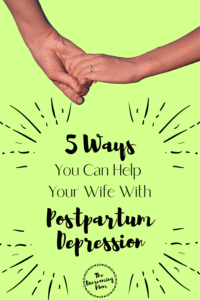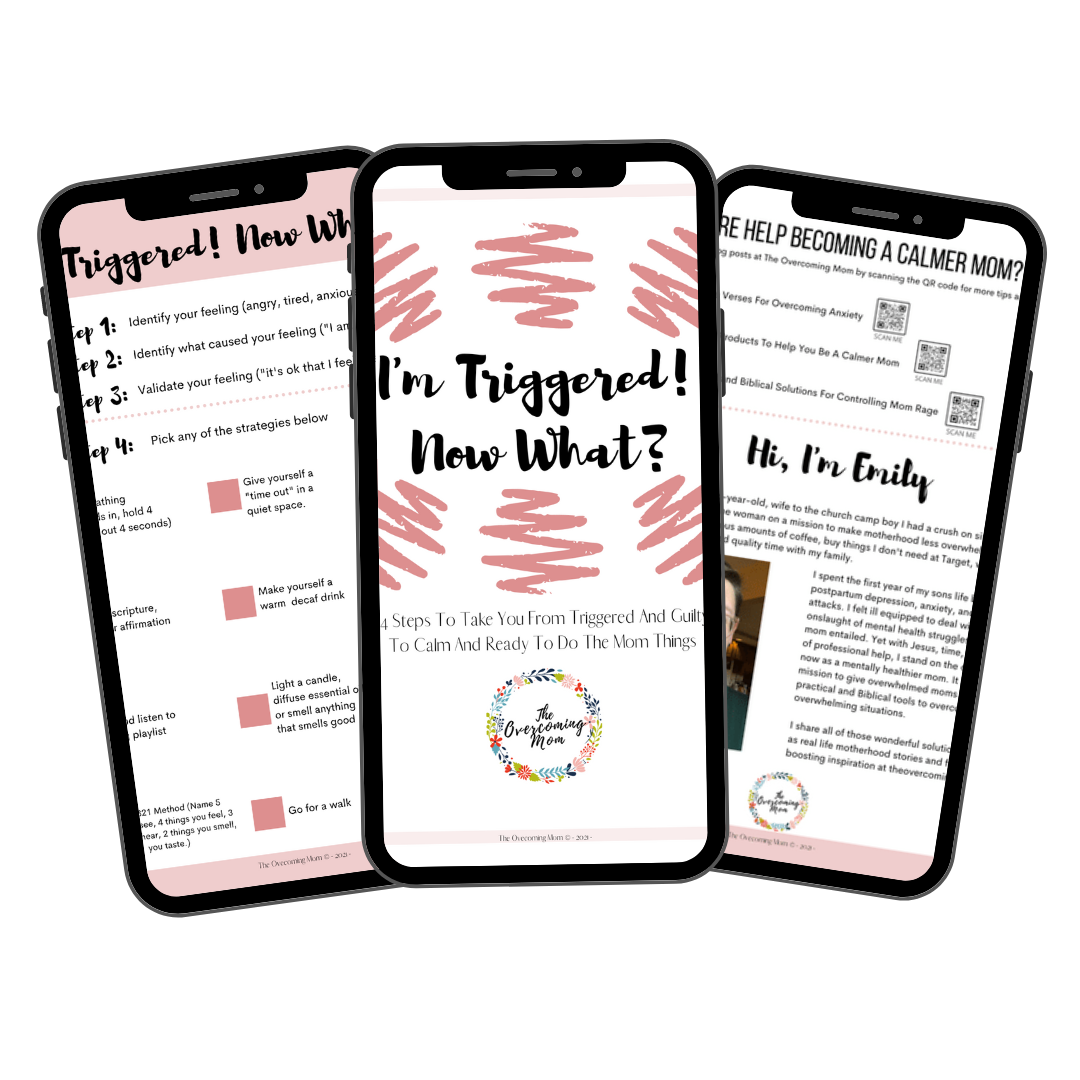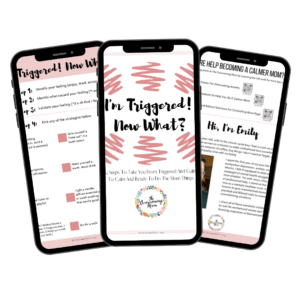This page may contain affiliate links. As an Amazon Associate I earn from qualifying purchases. If you want more information, please see my Affiliate Disclosure.
Being a husband whose wife is battling postpartum depression can often feel like watching a battle through a telescope. You want to help, but feel helpless and useless. Husbands who feel helpless or useless either do one of two things. They either try to take control of the situation, or they run away from it. A husband who controls their wife battling PPD may invalidate her feelings, force her to do more than she physically or emotionally can, or lose patience with her. A husband who runs from his wife’s PPD may ignore her feelings, be too afraid to step in and help, or emotionally distance himself from his wife and family. Meanwhile, the wife of the man who controls or the man who retreats is left to navigate the storm of PPD alone.
Husbands, I know it can be hard to know how to help. You may know absolutely nothing about postpartum depression. Before you continue with this, I highly recommend familiarizing yourself with what postpartum depression is. Postpartum Support International is a wonderful resource with symptoms and tips on navigating PPD. Understand the symptoms of PPD will help you better understand what is happening to your wife. I also have a blog post about my battle with PPD, as well as “5 Myths about Postpartum Depression We Need To Stop Saying“.
I know you’re reading this article because you want to help. You’re hurting because your wife is hurting, and that is normal. In reading this you’re already taking an active step in riding out the PPD storm with your wife. I know when this is all over, your wife will know you’re there for her in everything.

1- Validate her feelings and support her decisions
To put it simply, your wife doesn’t want to be fixed, she wants to be supported. When we have the mindset of trying to fix postpartum depression, we start phrasing things as if it’s as simple as hammering a nail. For example, it’s easy to simply tell someone to “stop crying” when they’re crying. Will that fix the root cause of the crying? Absolutely not! Psychologically, that sends the message that “if I was told to stop crying, but I can’t, then there’s something wrong with me.” Even something as simple as rephrasing our responses to our spouses emotions can be vital to your spouse’s PPD recovery
When your wife is struggling, here’s phrases that may not make her feel validated:
- Just get over it.
- It can’t be that bad.
- It’s just a phase.
- It doesn’t matter, he/she’s just a baby.
- You need to do…
- Giving her excessive compliments when she’s having a hard day
Here’s some alternative phrases that may help you wife feel more validated and supported:
- I’m sorry you’re going through this.
- I support whatever decision you make.
- What can I do to help? (or better yet, just help!)
- It’s hard to make big decisions for our child. Let’s weigh out the pro’s/con’s together
- I know your body has changed a lot. That must be difficult to cope with
Your wife doesn’t need you to be Mr. Fix It, she needs you to hold her hand and help her through the storm. Understanding that is the key to helping her feel validated and supported. I wrote a blog post called “9 things you should never say to someone with anxiety,” that offers more insights on how to validate feelings. Even though the article is for anxiety, this can overlap with postpartum depression as well. Feel free to check it out for additional help.
2- Find simple ways to make her life a little easier
I will say it again, the postpartum mental load is HEAVY! There is a lot on her mind after having a child, and there are only so many mental lists (or physical lists) a person can keep track of. Sure, you could give her a million suggestions on how she could juggle it all better, but rolling your sleeves up and doing the dirty work will speak much louder! It is more beneficial for your ears to be more open than your mouth.
If you hear your wife rattling off a mile-long list of things to do, of course, validate her feelings (“that’s a lot of stuff to do. That seems overwhelming”), and then pick some things off her list and do them! If you see the sink is overflowing with dishes, and it is in your power to do something about it, then roll up your sleeves and do it! You could ask her if she’d like for you to do that, but I think it’s always nicer to just do it. Does the baby have a dirty diaper but your wife is busy consoling your upset toddler? Then grab that baby and change their diaper! I know, it sounds almost too simple, but when husbands silently step up to the plate, it is almost always noticed.
If you want to take it a step farther than completing random tasks, set up a chore list with your spouse. Figure out what tasks you can divvy up throughout the day, and write them down. For example, early on after having my first son, doing the dishes always felt like too much. After discussing it, we decided my husband would pick up dish duty in the evenings. It’s been quite a while since we’ve done that, and it has given me so much sanity!
When you take tasks off your wife’s overloaded plate, whether it’s spontaneously or planned, you are showing your wife that you care about what she cares about. That camaraderie is something your wife will be sure to appreciate for years to come!
3- Find out her love language, and demonstrate your love with HER love language!
If you’re unfamiliar with love languages, it is a concept coined by author and marriage counselor, Gary Chapman. In short, your love language is the way you give and receive love the best. The 5 love languages are words of affirmation, acts of service, quality time, physical touch, and receiving gifts. I highly recommend that you and your spouse take the love language quiz, and if you want more information on love languages, purchase the book “The 5 Love Languages.”
Often times when we display love to someone else, we display it in the way that resonates the most with us, not the one we’re trying to display love to. For example, If my husband’s love language is physical touch, but mine is acts of service, he may feel more loved if I choose to hold his hand while watching tv than if I clean the bathroom for him. Understanding your spouses love language can be the key to demonstrating your commitment to them postpartum.
If you discover that your wife’s love language is acts of service, then pick up some tasks around the house. Perhaps her love language is physical touch, then offer to give her a massage. If her love language is quality time, then consider setting up a date night, even if it’s as simple as popcorn and a movie while the baby is sleeping. If her love language is words of affirmation, compliment her throughout the day. And if her love language is receiving gifts, surprise her with a gift, even if it’s as simple as a cute post-it on the bathroom mirror.
After a woman has a baby, it can be easy for her to feel a loss of identity. When you do things that make her feel noticed, such as showing affection in her love language, you make her feel seen. Feeling seen postpartum can be game-changing for any woman. For more information on the 5 Love Languages, I highly suggest checking out the 5 Love Languages website.
4- Be patient
Bringing a human into this world is difficult, and the physical and mental recovery can be long. Some new data shows that many women’s bodies can take up to two years postpartum to fully recover from childbirth. On top of that, many women experience mental health struggles, such as postpartum depression and anxiety, for around 2 years postpartum. This simply means that it may be a long road to returning to a sense of normalcy for your wife. This requires you to be a rock for her. Be patient with all the changes she is experiencing.
For example, I know that most women are cleared to have sex again at 6 weeks postpartum. This doesn’t mean that she is ready for it! Her body may still be in pain, or she may not feel comfortable in her postpartum body yet. Don’t pressure her into something she isn’t ready for. Give her love and space to adjust to the newness of her body.
Beyond the bedroom, some household expectations may need to be adjusted. If she has faithfully done all the laundry for years, but she’s unable to do it now, then help her. Don’t pressure her or make her feel bad for not getting things accomplished. Be patient and accommodating when it comes to tasks your wife typically does around the house. This may even mean you might have to learn how to preheat an oven or boil a little water. Patience is key to riding out the postpartum depression storm.
5- Get professional help, together
I cannot stress enough how beneficial it is for new moms and couples to get professional help! For new moms, they may not believe that they have more going on than your standard “baby blues” until they see a therapist. A therapist has the tools to help you and your wife navigate the PPD storm. If you’re a Christian and you’re not sure if therapy is for you, I highly suggest reading my blog post, “Should Christians Go To Therapy?“
Of course, therapy is beneficial to struggling moms, but if you are struggling with understanding how your wife is feeling, then go to therapy with her! Many therapists are comfortable and welcoming of working with couples. A therapist can give you more targeted advice on how you can help your wife through her storm, as well as give a deeper understanding of what is happening with her. It may be nice for your wife to see that you’re willing to do the work of therapy alongside her and that she doesn’t have to do it alone.
If you do decide to go to therapy for PPD together, please remember to respect your wife’s boundaries. Your wife may need to talk to the therapist about private matters that she doesn’t feel comfortable sharing with you. Do not take it personally! That is the job of a therapist, and your wife has the right to share those issues without your consent. If she doesn’t feel comfortable talking about what she discussed in therapy with you, don’t pressure her to tell you.
The key to going to therapy together is understanding you’re riding out the storm together. This isn’t her storm that she faces alone, you are in the boat with her. Getting professional help is like calling Mission Control for assistance. They can give you the tools and the guidance to help you to safety, but you have to be willing to do the dirty work with her.
Riding in the Postpartum Depression Boat
In order to properly validate your wife’s feelings, help her, love her in her love language, have patience with her, and seek professional help with her, it’s important to remember that this isn’t a struggle she does (and shouldn’t do) alone. Think of postpartum depression as a boat in the middle of the storm. Because you love your wife and want to keep her safe, it would be easy to take control. The problem is that it isn’t your boat, this is your wife’s boat. She’s the one trying to navigate the storm in her mind, and you happen to be on the boat with her.
You can’t be the captain in this scenario, you need to be the crewmate. Simply put, you can’t be the one barking orders at your wife or the person who sits back in fear while you watch your wife sink. You have to be the good crewmate that says “what do you need me to do? I’m gonna lower the sails for you. Let me scoop some water out of this boat for you. I’ll patch this hole. I’m here for you, captain!” Your wife, the captain of her own mind, feels like she is drowning right now, and she needs her crewmate to help her from sinking.
I know any husband who loves his wife wants to help them through PPD. But often they don’t feel they have the skills to do so. It is my hope this article helps with giving you the tools to help become the crewmate your wife needs in the middle of her storm.










